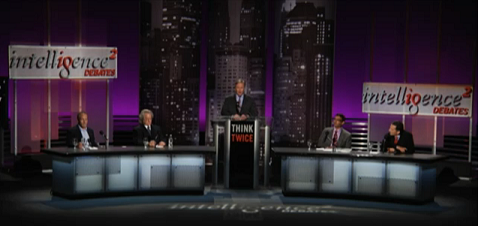
Last night, Adam and I attended the Intelligence Squared debate “Would The World Be Better Off Without Religion?” I am inclined to think that the world would be pretty much the same without religion. I don’t deny that religion is linked with tremendous atrocities – oppression, war and ignorance. However, I am not sure that these things are the sole purview of religion. As I said on twitter, religious problems also exist in a secular context – greed, bloodlust, prejudice all appear in our society in ways not directly related to religion. I think that a better way to state the motion would be “Does religion do more harm than good?” But as I have written previously, I think sometimes Intelligence Squared goes for the catchy title rather than a proposition that is easy to debate.
I think that the speakers were all impressive Matthew Chapman and A C Grayling for the motion and Dinesh D’Souza and Rabbi David Wolpe arguing against. However, I was a little disappointed with the fact that neither side really made an effort to frame the debate, and both sides seemed to be talking past each other. Chapman and Grayling cited ridiculous and cruel passages from the Bible and stressed that religion deters science and oppresses women and gay people. D’Souza and Wolpe spoke of the good things religious charities do and of how people need hope and to set high moral standards. Rabbi Wolpe pointed out that the other side kept stressing the text whereas he was talking about the actions of religious people. This was an excellent point, and wasn’t countered at all.
Still, I felt like there was a lot being left unsaid. I did get to ask a question. I asked, “For those in favor of the motion, how are the harms of religion different from those of nationalism and racism? And for those opposed to the motion, how are the good things about religion different from the benefits of secular charities, community organizations or having close relationships with family?” Chapman said other societal ills are “mistakes based on reason” and that the “horrors of religion” are based on “superstitious fear and delusion.” I’m not sure if he really means to say that racism is rational, but what I think he is missing is that superstition and delusion exist outside of religion. Rabbi Wolpe said religion is good because religious people do good works for a transcendental, enduring purpose. I find this also kind of silly and trite. What if your enduring purpose was because you wanted to be remembered after you died as a philanthropist? There are reasons people do good things for all kinds of philosophical, moral, and social purposes, some of which are selfish but as a person who enjoys art museums and a yearly concert at Carnegie Hall, I can’t criticize the “selfish” philanthropists too harshly.
As a Unitarian Universalist, I am glad that my congregation exists. I am interested more in ideas of orthopraxy – how we should live a moral life, and the faith I have that we are called to do good works – than theological debates about the existence or nonexistence of God. But I am in no denial about the atrocities human beings are capable of. I believe a case can be made that there would be less cruelty in the world without religion, but it was not made last night by Chapman or Grayling. Brilliant writers though they may be, they never specifically explained how religion discourages critical thinking or why it halts scientific progress. I understand those arguments thoroughly, but wonk than I am, I needed to hear them spell it out before I would vote for them. I was frustrated with D’Souza’s arrogance and odd non-sequitirs (if Catholicism is better than Hinduism because it lacks a caste system, then doesn’t Hinduism make the world worse?) I liked Rabbi Wolpe the best of all the speakers but he never explained why a religious person is better off because of religion than they would be if they simply were involved in secular charities and had an active social life. In his closing statement he made a touching statement about hope, but hope comes from all kinds of places, and is not solely the province of religion.
I maintain that the world would be much the same without religion, a few inspiring heroes, some terrible villains, and most of us falling somewhere in between.




